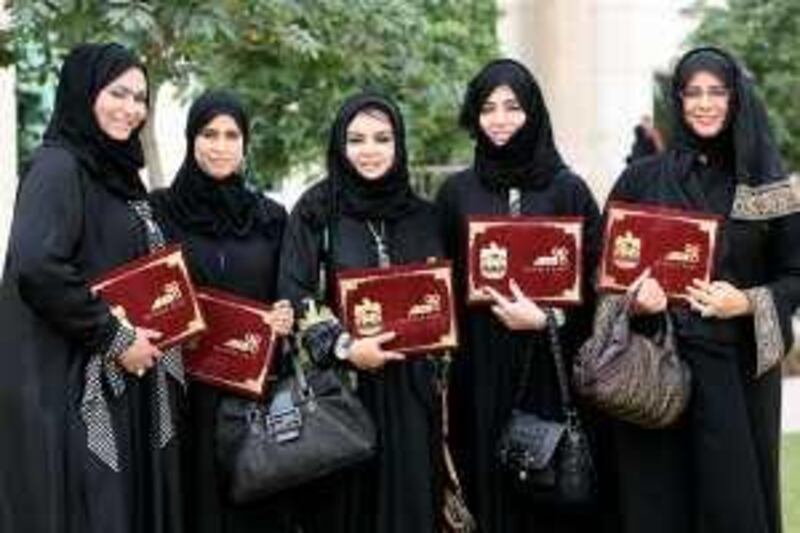DUBAI // In a major milestone for the overhaul of the federal education system, 60 teaching supervisors, who will be responsible for helping retrain thousands of their colleagues, graduated from their programme yesterday. The supervisors will now be placed in schools across the northern Emirates as part of the reform plan announced by the Ministry of Education last year to address what is widely seen as a failing system.
Many teachers working in state schools lack educational qualifications and the ministry does not have a teacher certification programme in place. In Sharjah, parents have become so concerned about the exam results in government schools that they have this week arranged a series of meetings within schools with pupils in an effort to identify and tackle the problems. The federal retraining project aims to bring 10,000 teachers up to speed in state schools across the northern Emirates.
The graduates will pass on the same training they have received to their colleagues over the next two years. Similar steps are being taken in other emirates. Abu Dhabi is running a teacher-retraining scheme which concentrates on improving the skills of principals, who are in turn expected to raise the teaching standards at their schools. In Dubai, the Knowledge and Human Development Authority has introduced school inspections to improve standards.
"The foundation of our educational reform is centred on our students," said Dr Hanif Hassan, Minister of Education, at yesterday's graduating ceremony. "Our goal is to build an educational system that will prepare our students to become leaders in the 21st century. The journey is long and we are only at the beginning, but there are many opportunities on the way. Our commitment [to the programme] is unshakeable."
As part of the "Teachers for the 21st Century Professional Development Project", the teacher supervisors received training in four areas: teacher planning and preparation; the classroom environment; instructional practices; and individual professional responsibility. The graduates will go into classrooms on March 1. They will supervise their fellow teachers, observing their teaching methods and guiding them towards more student-orientated methods.
"We want all our students to have access to a high quality of education where our schools are designed for student-centred learning and are considered centres of learning in our communities," said Dr Hassan. According to Nabeela Mirza, the director of the professional development department at the ministry, the aim of the programme is to bridge the gap between knowledge and implementation. "Before, there was a struggle between what the teachers know, and how they need to implement it in classrooms," she said. "Through this programme we are closing that space, and focusing on the student."
The teachers will also be provided with online services, professional development forums, and newly translated books, to remain up to date on their subjects. Dr Gene Carter, the executive director of the Association of Supervision and Curriculum Development (ASCD), which worked closely with the ministry on the training programme, said the purpose of the project was to "enhance the skill sets of teachers so that they meet the unique needs of their students, through customisation and personalisation".
"It places the teacher in the position of guiding the student, using several different methodologies to enhance learning," he said. Teachers are being trained to create environments that are supportive of learning, while at the same time ensuring students are aware of their responsibility to learn. "It is a two-way street," said Dr Carter. One of the graduates, Aisha al Jesmi, a teacher at Bahithat al Badiya School, in Fujairah, praised the programme for introducing a new level to teaching standards.
She especially liked the fact the training was student-focused. "This creates a more autonomous way of learning, through the use of teaching aids and research, and making everything much more student centred," she said. "Students need to learn from their own actions and research, because everything will become more memorable for them." It is about getting the students to adopt a certain mindset, she said. If the student is engaged and active in their learning, they will retain more information.
Natasha Ridge, a visiting research fellow at the Dubai School of Government, who wrote her doctoral thesis on education in Ras al Khaimah, said the plan to retrain the teachers was positive. "It is a huge undertaking. We are seeing a lot of knee jerk reaction but very little proactive learning or learning based on research. Until policy changes are based on research findings I don't know if it will be possible properly to change the education system here.
"All the Gulf countries have the same education problem. The quality of education seems to be in inverse proportion to the amount of money they have." nsamaha@thenational.ae






